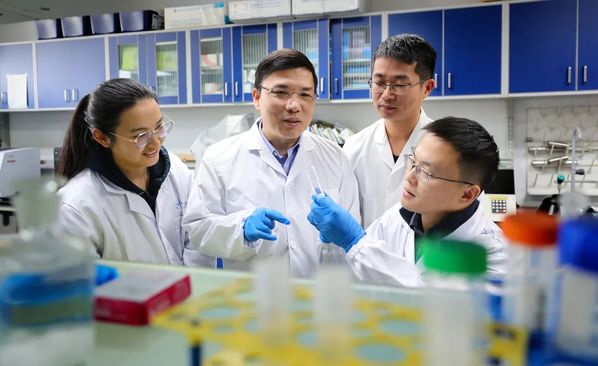The use of natural enemies to control pests in agriculture is not only an environmentally-friendly and ecologically-safe biological control technology but also one of the important measures to ensure green vegetable production. Prof. CHEN Xuexin's team has been committed to this field for the past 30 years and achieved a series of theoretical breakthroughs and technological innovations. This achievement earned him the second prize of the 2020 State Scientific and Technological Progress Award.
In the early 1990s, biological control emerged into the public sphere. However, the domestic scientific community still knew little about the species of natural enemies and their biological traits. Accordingly, Prof. Chen's team conducted a large-scale investigation of natural enemies of insect pests for more than 30 years.
The team studied two major categories: general predatory insects, such as lady beetles that feed on pests, and parasitic insects, such as parasitic wasps that develop at the expense of a host insect, the majority of which are agricultural pests, and eventually kill it.

By conducting long-term systematic investigations, scientific identifications and analyses, the team found the major natural enemies of vegetable pests in China, and the number of known species of natural enemies was increased by 83%.
Today, this type of survey is still going on. Upon entering Prof. Chen's office, you can see an insect trap net. "I take my team members out to conduct field surveys every year," said Prof. Chen.
Once the species were identified, the team started to delve into their characteristics. For starters, they raised natural enemies in the laboratory. While natural enemies could survive in the wild, it was far from an easy task to raise them in the laboratory. The team had to make constant adjustments in temperature, humidity, light, and nutrition. Meanwhile, the team screened out 22 dominant natural enemies based on three criteria: the frequent occurrence of natural enemies in the field, the high rate of predation or parasitism, and the remarkable adaptability to the environment. They systematically elucidated their key biological characteristics such as growth, development and reproduction. They also revealed the effective ways of different species of natural enemies for manipulating the insect pests and their interaction and cooperation among different species. These findings provided an essential scientific basis for the mass rearing of natural enemies and their augmentation and utilization in fields.

By conducting research on insects as tiny as a sesame seed, the team successfully figured out the mass rearing and production of 12 dominant natural enemies such as Trichogramma chilonis and Diadromus collaris. "Perseverance is the key to our success. I am proud that we persisted in the roughest times and can thus accumulate a lot of technology for the application of natural enemy in pest control," said Prof. Chen.
Nowadays, as long as natural enemies are placed and released in five spots in a vegetable greenhouse, insect pests can be effectively controlled. The costs of applying pesticides and using natural enemies are literally similar, but the tomatoes without the use of pesticides are of higher quality and they are thus sold at higher prices. Moreover, the release of natural enemies in fields makes pest control easier and more convenient compared with the tedious drudgery of pesticide use.
How can large-scale production of natural enemies be achieved? This calls for a natural enemy factory.
Prof. Chen led his team to invent a variety of equipment for mass rearing, collecting, packaging, storage and shipment of natural enemies, to develop a standard process for mass production of natural enemies, and to formulate corresponding quality criteria and protocols. Through the technical assistance of the team, nine enterprises already have been established with an annual production capacity of up to billions of natural enemies.
In terms of pest control, Prof. Chen's team innovatively proposed the key technology of "Natural Enemy Insects +" and devised an integrated green pest control system suitable for different regions and cultivation patterns. After years of applications, the average pest control efficiency reached more than 85% and the use of pesticides was reduced by more than 60%.
In China, more than 20 million hectares of area are used for the cultivation of vegetables, and the applications of natural enemies show enormous potential for pest control in green and safe vegetable production.
Photo credit: LU Shaoqing






